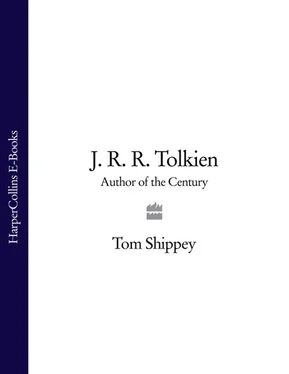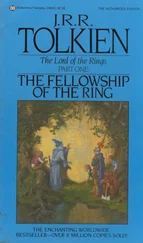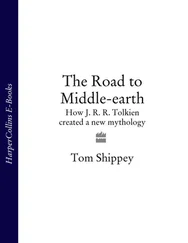Chapter IV extends the discussion of evil to consideration, first, of the evident connections between The Lord of the Rings and modern history (Tolkien denied ‘allegory’ but conceded ‘applicability’); and second, of the attempt to reach out beyond contemporary relevance and beyond archaism to something which governs both – timelessness, ‘the mythic dimension’, and Tolkien’s own idiosyncratic but well-informed view of literary tradition. This chapter also takes up one of the major apparent paradoxes of The Lord of the Rings. It was written, we know, by a devout and believing Christian, and has been seen by many as a deeply religious work. Yet it contains almost no direct religious reference at all. Returning to the theme taken up in chapter I, I argue that The Lord of the Rings can be taken in itself as a myth, in the sense of a work of mediation, reconciling what appear to be incompatibles: heathen and Christian, escapism and reality, immediate victory and lasting defeat, lasting defeat and ultimate victory.
The last two chapters set Tolkien’s two major works in the context of his other continuing literary activities, both those published and. those unpublished in his own lifetime. A major aim of chapter V is to provide a guide to reading the published Silmarillion, a work which is quite outside any modern reading or writing conventions, but which has never received the credit normally extended to the ‘experimental’. However, it considers also the growth and development of the (non-italicized) ‘Silmarillion’, by which I mean the many parts of the overall legendarium eventually published in the twelve-volume sequence, The History of Middle-earth. Two dominant ideas in this chapter are, first, Tolkien’s own complex notion of literary ‘depth’, by which a work – like Lord Macaulay’s famous Lays of Ancient Rome – gains added charm from having a sense behind it of an older history now lost, as well as of a later and less truthful history now more familiar; and second, the deep sadness which infuses all ‘Silmarillion’ versions, and which may be seen with hindsight to underlie even the cheerful hobbits and their epic, The Lord of the Rings.
Chapter VI takes up some of the reasons for this sadness, and considers what some of Tolkien’s minor works tell us (and for all his dislike of biography, were intended to tell us) about his inner life. A feature of this chapter is the claim that at least two of his minor published works, ‘Leaf by Niggle’ and Smith of Wootton Major, are in their different ways ‘autobiographical allegories’. The case may seem a hard one to make, since Tolkien’s expressed disapproval of allegories is well-known. I hope nevertheless to have made it, even within Tolkien’s own deliberately narrow definition of allegory. My view is that he felt allegory had its place, and its rules, and that his scorn was reserved for those who insisted on using it and detecting it outside that place. In between my readings of those two works, one early, one late, I consider the small corpus of poems which Tolkien published, and sometimes republished, in his own lifetime, relating them in some cases to his personal myth of ‘the Lost Road’, expressed in two separate abortive attempts to write another major fiction. Besides The Hobbit and The Lord of the Rings, Tolkien’s only other entirely successful narrative published in his own lifetime was the unusually light-hearted novella Farmer Giles of Ham. I attempt further to fit this, along with two other poetic narratives, into Tolkien’s again idiosyncratic but well-informed view of literary history.
In the Afterword, finally, I take up once more the criticisms of Tolkien which underlie the outrage mentioned at the start of this Foreword. It is to a large extent a guessing-game. Very few of Tolkien’s critics (there are some honourable exceptions) have been prepared to put their dislike into an organized shape which can be debated; one of the most vehement indeed confessed to me, in private, in the lift taking us out of BBC House after a radio debate, that he had never actually read The Lord of the Rings which he had just been attacking. I find myself accordingly sometimes making the case against so that I can make the case for, not an ideal procedure. Still, the repeatedly expressed dislike of an influential and easily-identifiable section of the literary world is part of the phenomenon. Very probably the reason for the dislike has a good deal to do with the reasons for the success. Tolkien has challenged the very authority of the literati, and this is never forgiven.
The obverse of this exercise is to look in slightly more detail at Tolkien’s emulators. We may not be sure exactly what people have liked in Tolkien’s work, but we can see what writers have tried to imitate, as also what they have shied away from. Some of them, of course, may have superseded him, used his work only as a starting-point for quite different directions, even in some respects outdone him. It could be said that this latter is one of the best things that can happen to an innovative writer: Tolkien indeed wrote (see Letters, p. 145) that he had hoped once that his story-cycles would ‘yet leave scope for other minds and hands’. He then immediately and self-deprecatingly dismissed his hope as ‘Absurd’ (this was in 1951, The Lord of the Rings still unpublished).
However, similar results have been achieved by other philologist-creators. Lönnrot’s Kalevala is now viewed with suspicion by scholars, because Lönnrot, like Walter Scott with the Border Ballads, did not just collect and transcribe, but wrote, rewrote and interpolated, so that you cannot tell what is by him and what is ‘authentic’. Just the same, the date of publication of the Kalevala remains a national holiday in Finland, and the work has become a cornerstone of national culture. Very similar accusations of interference and meddling have been made about the Grimms and their Fairy-Tales ; but for two centuries the tales have enriched not just national but international culture, and delighted hundreds of millions of child and adult readers. Nikolai Grundtvig, the Dane, insisted on the concept of levende ord, ‘the living word’. It is not enough for the philologist, the ‘word-lover’, to be scholarly. The scholar also has to transmit his results into the life and speech and imagination of the greater world.
In 1951 Tolkien, like Théoden King when we first meet him, can have had little hope of such success. By his death-day, however, he could well have said that, like Théoden, when he went to join his (philological) fathers, ‘even in their mighty company I shall not now be ashamed’. Tolkien left a legacy as rich as any of his predecessors’.
Конец ознакомительного фрагмента.
Текст предоставлен ООО «ЛитРес».
Прочитайте эту книгу целиком, купив полную легальную версию на ЛитРес.
Безопасно оплатить книгу можно банковской картой Visa, MasterCard, Maestro, со счета мобильного телефона, с платежного терминала, в салоне МТС или Связной, через PayPal, WebMoney, Яндекс.Деньги, QIWI Кошелек, бонусными картами или другим удобным Вам способом.












